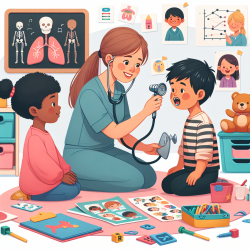Unlock the Secret to Better Therapy Outcomes: Lessons from Food Pantries
In the realm of speech-language pathology, especially in the context of online therapy services provided to schools, it is crucial to continually seek innovative approaches to improve outcomes for children. Interestingly, a recent study on the distribution of fresh foods in food pantries during the COVID-19 pandemic offers valuable insights that can be applied to our field. The study, titled "Distribution of fresh foods in food pantries: challenges and opportunities in Illinois during the COVID-19 pandemic," highlights barriers and facilitators that can inspire new strategies for enhancing therapy services.
Understanding the Challenges and Opportunities
The study conducted focus groups with 49 pantry representatives across Illinois to explore the challenges and opportunities in distributing fresh foods. Key findings revealed that community partnerships, organizational policies, and the quality of donated foods significantly impacted the distribution process. These insights can be leveraged to enhance the delivery of online therapy services.
Applying Insights to Speech-Language Pathology
Here are some actionable strategies for practitioners to consider:
- Foster Community Partnerships: Just as food pantries benefit from partnerships with local organizations, speech-language pathologists can collaborate with schools, parents, and community groups to create a supportive network for children. This can enhance resource sharing and provide a more holistic approach to therapy.
- Implement Data-Driven Policies: The study emphasizes the importance of policies that prioritize quality and client needs. Similarly, practitioners should develop data-driven policies that focus on evidence-based practices, ensuring that therapy sessions are tailored to the unique needs of each child.
- Enhance Resource Quality: Pantries faced challenges with the quality of donated foods. In therapy, ensuring high-quality resources and materials is crucial. Practitioners should regularly evaluate and update their tools and techniques to maintain effectiveness and engagement.
Encouraging Further Research
The study underscores the need for ongoing research to evaluate the effectiveness of initiatives aimed at improving food distribution. Similarly, in speech-language pathology, continuous research is essential to refine therapy methods and validate new approaches. Practitioners are encouraged to engage in research activities, collaborate with academic institutions, and stay updated with the latest findings in the field.
Conclusion
By drawing parallels between the challenges faced by food pantries and those in speech-language pathology, practitioners can gain fresh perspectives and innovative ideas to enhance therapy outcomes. The study serves as a reminder of the importance of community collaboration, data-driven decision-making, and a commitment to quality in delivering effective services.
To read the original research paper, please follow this link: Distribution of fresh foods in food pantries: challenges and opportunities in Illinois during the COVID-19 pandemic.










